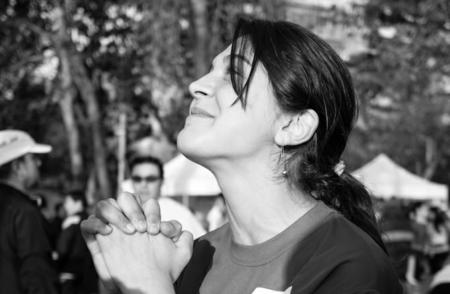Gratitude is a spiritual practice
Like many families, during the holidays we try to focus on thankfulness by asking each guest at a festive meal to express that for which they are most thankful.
Surprising how tongue-tied a roomful of noisy siblings, aunts, uncles and cousins suddenly becomes when given this task. Sometimes, one kid comes up with a winning response -- "I'm thankful for my family," -- and the sentiment becomes repeated by every child at the table until I want to scream, "Can't you guys think of anything original?"
But, since we also focus on not screaming during the holidays, I can only hope that this unanimous sense of thankfulness for relatives will temper the political and football rivalries that may pop up during the course of the meal.
Gratitude is supposed to be a key to our spiritual lives. So why is it that sometimes it feels so rote? How can this "thank you" to God -- which the mystic Meister Eckhart said was so important it could be our only prayer -- become so routine?
Recently, in an effort to reduce the population of our overcrowded prisons, the federal government released 6,000 nonviolent offenders who had been given mandatory sentences.
I listened to one of these newly released prisoners being interviewed in late October on National Public Radio's "Weekend Edition Saturday." He provided a lesson in gratitude that seemed worthy of a saint.
In the early 1990s, Michael Fitzgerald Wilson was given a sentence of life without the possibility of parole for a first-time, nonviolent drug offense. During this time, the nation was responding to the drug crisis by mandatory sentencing, and prisons were filling so rapidly that soon the U.S. imprisoned more of its population than any nation in the world.
The presiding judge felt the sentence was harsh, but the law forced his hand. Although no drugs were found in his home, Wilson was charged with distributing crack cocaine. A bad thing -- but so bad that we should throw away the key and with it his life?
Wilson left behind a 3-year-old son who is now 26. Throughout his imprisonment, Wilson tried to maintain a relationship with his son that endures to this day.
Now freed, is he angry? "No," he says.
Instead, he thanks God for his freedom, and he's thankful for many things. He even says, in a voice slurred by a stroke he suffered in prison, "I thank God for ... even the people who had testified against me."
You can sense his inner peace. Gratitude seems to wash away the wasted years of youth and health, the injustice that would leave a lesser man bitter.
How does one arrive at such a place of spiritual grace? Does grace bring us to gratitude? Perhaps a practice of gratitude helps us to see and accept grace.
St. Ignatius of Loyola taught that we should see God in all things. That's an invitation to learn gratitude. Because in the normal course of a day or a year or a lifetime, things happen for which we may not express gratitude.
It's one thing to see God when you get what you want; it's quite another to thank God for his presence when you suffer things you didn't choose.
So when bad things happen, we must ask, where is God in this? And that place where God is, in the midst of struggle and darkness, is that for which we are grateful.
Gratitude is a spiritual practice. All the theology and the doctrine and the sophistry in the world don't tell me as much about grace as Michael Fitzgerald Wilson told me in his simple litany of gratitude.
EFFIE CALDAROLA IS A COLUMNIST WITH THE CATHOLIC NEWS SERVICE.
- Effie Caldarola is a columnist with the Catholic News Service.



















